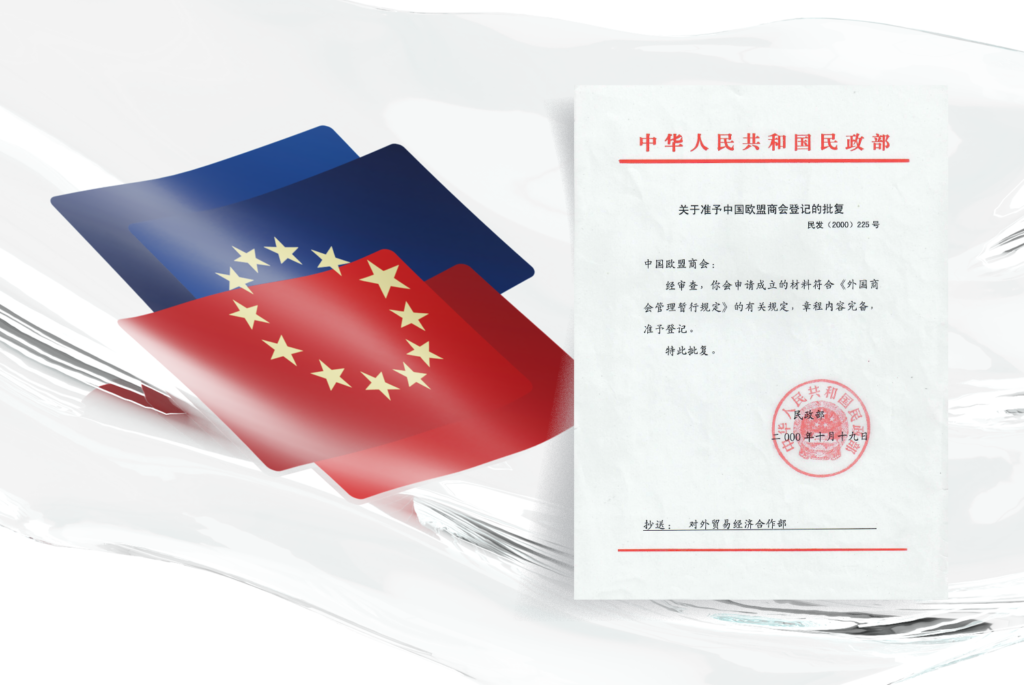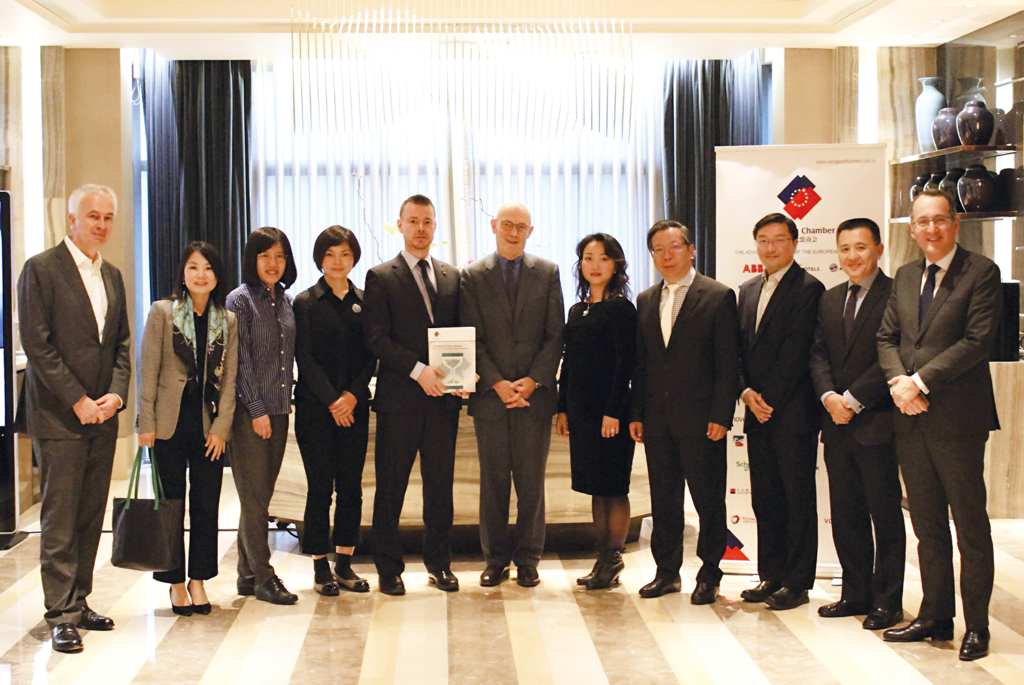
The connections and collaborations between the two sides
Pascal Lamy
Director-General, World Trade Organization(2005–2013)
Commissioner for Trade, European Commission (1999–2004)
Head of Cabinet for President of the European Commission, Jacques Delors (1985–1994)

You witnessed the establishment of the European Chamber of Commerce in China. Compared to the situation back then, how would you evaluate the current foreign investment market in China?
Compared to the situation 20 years ago, some things have changed and some not. One thing that has significantly changed is that the Chinese market has grown immensely. Therefore, the Chinese market remains extremely attractive for foreign investors and operators. However, there is indeed one aspect that I hope could change a little bit faster. Although some impediments to foreign investment have been eased to a certain extent, restrictions for EU businesses in China remain; this process of opening Chinese market for both foreign investments and trade happens in a too slow manner. So, there remains quite a lot to be done.
The ongoing US-China trade disputes have caused damages for the EU businesses in China. What do you think they could do right now in order to reduce the impact?
I think this is not very much in the EU’s hands. Some US anti-China measures have collateral damaging consequences for EU operators, like export bans or sourcing limitations. These measures that prevent foreign companies from doing specific things with Chinese operators, notably in the tech sector, can hit European operators in China. These measures are an indication of a characteristic US diplomatic phenomenon, or a longstanding problem with the US, ie ‘extra-territoriality’ when US measures apply beyond the normal US jurisdiction ie US firms and hit non-US operators, including European ones. This extra-territorial approach is a big international and geopolitical legal issue, so it is not something that European operators in China can address.
How about the current China-EU investment deal? How do you evaluate the negotiation process of this agreement?
The major problem or the major focus of the negotiations is, as always, whether EU and China can reach a proper level of reciprocity in terms of trade, investment, and perhaps other issues. The reciprocity is in terms of both the size of the market that is open to investment and the size that is not open to investment. The negotiations also address the sectors of the markets that are strategic, politically sensitive or have other natures, thus can only be opened to foreign investments or international trade under specific conditions. We can see the whole progress of negotiating is inevitably complicated. In my personal view, I hope the structure of the overall agreement between EU and China could look like “the whole market will be open, except when under conditions A, B, C, D and E,” because this concise structure makes it easier to negotiate.
But of course, the negotiating progress in reality is always much more complicated and time-consuming, because when the two sides are talking about whether or not this agreement in discussion reaches an adequate level of reciprocity, they have to take political judgements into consideration. According to my own experience, until the very last minute, both of the two sides will keep arguing that, “we are giving you more than you are giving us, so please pay a bit more.” But politics also matter, given the importance of the global signal that concluding, or not, the negotiation would send.
What do you think China could contribute to a healthier international trade field?
As the European Chamber in China has kept emphasising in their position papers, competitive neutrality is the most crucial concept for our trade and investment relationship right now. Competitive neutrality is the recognition that publicly owned Chinese firms which are in competition with the private sector, foreign or domestic, whether on the Chinese market or abroad, should not have a competitive advantage simply by virtue of government support. This implies disciplines on state aids, transparency, notifications, limitations. If China wants to keep opening trade and investment, it has to embark on accepting the consequences of achieving competitive neutrality. This is an important issue, and if it’s achieved, I believe it will be extremely beneficial to the international trading environment.
This is not about forcing China to change its economic or political system, or renounce ‘Chinese characteristics’ but about making these characteristics compatible with the rest of the world as far as trade and investment is concerned. It not about convergence, but about coexistence.
Note: This is a translated extract from an article originally printed in The Paper in their series ‘欧商在中国欧商在中国‘. (‘European Business in China’).
Catherine Ashton
High Representative of the European Union for Foreign Affairs and Security Policy (2009–2014)
First Vice President of the European Commission (2009–2014)
Commissioner for Trade, European Commission (2008–2009)

“When I arrived in China in 2009 in my role as European Union (EU) Trade Commissioner, my first meeting was with the European Union Chamber of Commerce. The organisation was then nine years old, and already a success story in Beijing. European business had a source of expertise and knowledge to which they could turn for advice, and a body that represented their issues and concerns to both China and Brussels. It is a remarkable story of success, with a membership that began modestly 20 years ago with 51 members and now exceeds over 1,700. This year, the European Chamber celebrates a successful 20 years of operation and continues to offer a first-class service to European business.
“During that very first meeting, we discussed the importance of building confidence in the relationship between China and the EU, and they impressed me with their deep understanding of the realities of working in, and with, China. Europe had supported China’s membership of the World Trade Organisation (WTO) and worked with China on the Doha Development Round of trade negotiation, but was looking for ways to strengthen the bilateral trade and investment links. The Chamber, with its focus on fact-finding, could point to areas where business could see progress, and areas where friction was a serious concern, using the direct experiences of business throughout my dialogue.
“As I look to the future, the challenges that were clear then have been brought into even sharper relief. Political challenges between Beijing, Brussels, Washington DC and capitals from Canberra to London, together with growing concerns to ensure that business operates fairly, mean the Chamber of Commerce has a huge agenda for the coming months and years. There is increasing talk that China, once seen as a potential partner, is now increasingly a rival in Brussels. Hopes to move China to make reforms in trade have not been successful and concerns are growing. But there is still a level of ambition and a desire in Europe for a future with includes solid trade relations with China. If that ambition is to be realised, the European Chamber will be a vital partner for European business. As I congratulate them on their twentieth anniversary, I hope in Brussels and Beijing their voice continues to be heard, and their knowledge taken seriously.”
Karel De Gucht
Commissioner for Trade, European Commission (2010–2014)
Commissioner for International Cooperation, Humanitarian Aid and Crisis Response, European Commission (2009–2010)

During your visits to China as European Union (EU) Trade Commissioner, you participated in many meetings with the European Chamber. Did they help you in your dealings with the Chinese authorities, and if so, how?
My meetings with the European Chamber have time and time again been enlightening. I always got the feeling that the Chamber knew the files and what was going on better than we did ourselves. It was also striking that the European companies were more courageous and adamant in China than in their home countries. Although the changes we need(ed) have to be pushed through in the EU.
Taking the current trade and political tensions between China and the United States (US), as well as between China and the United Kingdom/Australia/India and numerous other economies into account, what can the EU and the European Chamber hope to achieve in the next 10 years in respect to China? Should the EU adopt a more hawkish approach to China, or persist with engagement?
I am in limbo about this question. On the one hand, there is every reason to play it more hawkish because we risk being confronted with a state-led capitalism for decades, and that state becoming more and more ruthless. On the other hand, you could hope/expect that China will realise it cannot be in a confrontation-like relationship with everybody. I believe we should swiftly further develop our toolkit to cope with unfair trading practices from China: a much bolder International Procurement Instrument coupled with a robust Chinese Government Procurement Agreement offer [to the World Trade Organization]; initiatives on the basis of the ongoing consultation on subsidies; a screening regulation with teeth; and above all, trade defence instrument-like regulations for trade in services. This would allow us to engage but leave the Chinese with no illusions about our resolve.
Cecilia Malmström
Commissioner for Trade, European Commission (2014–2019)
Commissioner for Home Affairs, European Commission (2010–2014)

During your visits to China as EU Trade Commissioner, but also in Brussels, you participated in many meetings with the European Chamber. Did they help you in your dealings with the Chinese authorities, and if so, how?
Yes, they were very helpful, the meetings gave me insights on the difficulties (and possibilities) that European companies are facing on the Chinese market and gave me further understanding of the complexities of the Chinese economy and politics. I used those insights, and sometimes examples, in my political dealings with my Chinese counterparts.
Taking the current trade and political tensions between China and the US, as well as between China and the UK/Australia/India and numerous other economies into account, what can the EU and the European Chamber hope to achieve in the next 10 years with respect to China? Should the EU adopt a more hawkish approach to China, or persist with engagement?
There are increasing tensions between China and the European Union (and the rest of the world). Europe, together with the European Chamber, has to be united and strategic vis-a-vis China. While we have every interest in engaging, trading and cooperating with China to reach the Paris goals [the 2015 Paris Climate Agreement goals] and to reform the multilateral system, Europe must also be firm on the need for China to play by the rules. Industrial subsidies for state-owned companies, dumping of products, cybertheft, discrimination against foreign companies and forced technology transfers, must stop. China must be true to the promises the country made when it joined the World Trade Organization (WTO). Europe will be tougher in investment screening and there will be an increasing diversification of some value chains in critical raw materials and other products. Also, Europe must speak up against the violation of human rights.
Having said all this, engagement is the only strategy; neither Europe nor China has anything to win from trade wars. Hopefully Europe can engage with others to convince China to get more involved in reform of the WTO.
Phil Hogan
Commissioner for Trade, European Commission (2019–2020)
Commissioner for Agriculture and Rural Development, European Commission (2014–2019)

During your visits to China as EU Trade Commissioner and EU Agriculture Commissioner, but also in Brussels, you participated in many meetings with the European Chamber. Did they help you in your dealings with the Chinese authorities, and if so, how?
The European Chamber of Commerce in China plays a hugely important role by providing an interface between EU authorities and businesses and Chinese authorities and markets. I found the Chamber to be hugely helpful, given their extensive network of contacts and strong understanding of China’s regulatory and business environment. During my missions to China as EU Agriculture Commissioner and later EU Trade Commissioner, I greatly appreciated the events hosted by the Chamber to help us as policymakers, and the European business delegations we were leading, to meet the right people and form important new relationships.
Taking the current trade and political tensions between China and the US, as well as between China and the UK/Australia/India and numerous other economies into account, what can the EU and the European Chamber hope to achieve in the next 10 years with respect to China? Should the EU adopt a more hawkish approach to China, or persist with engagement?
The EU has to strike a balance between working in partnership with China on key global challenges such as COVID-19 and climate, while also taking stronger action to ensure that our partnership is on a more equal footing.
The EU Commission’s analysis identifies China as a partner but also an economic competitor and systemic rival. On that basis, the challenge for the European Chamber is to maintain its interface role between EU authorities and businesses and Chinese authorities and markets, while also assisting the EU in the wider political goal of levelling the playing field between it and China.


Recent Comments